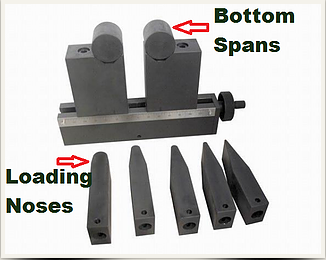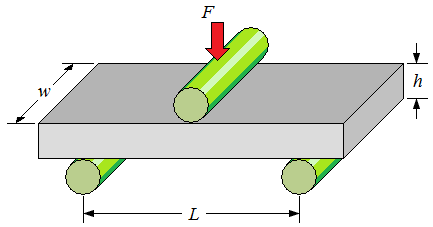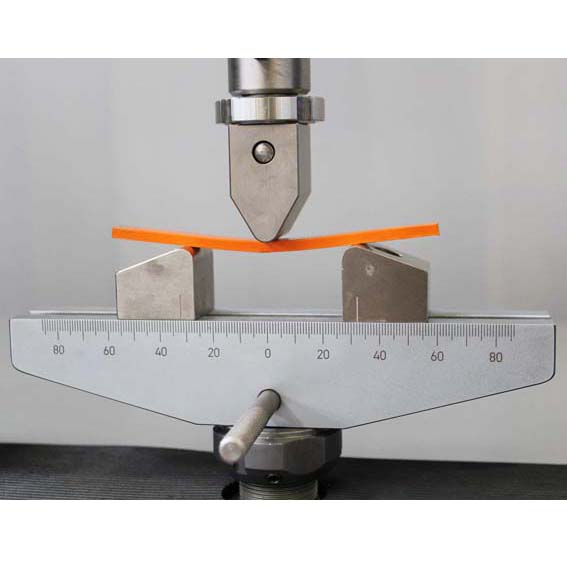- Universal testing machine
- Fixtures
- Biomedical device/equipment
- Vehicles (car, motorcycle)
- Compression/Flexural test
- Hardness tester
- Impact testing machine
- Torsion testing machine
- Abrasion & wear tester
- Plastic & Pipe testing
- Tensiometer / Goniometer
- Erichsen cupping tester
- Other Testing Equipment
- Grinding & polishing machine
- Introduction
- Specification
- Accessories
- Standard
- LEAFLET & VIDEO
- Contact Us
Flexure tests/bending test are generally used to determine the flexural modulus or flexural strength of a material. The material is laid horizontally over two points of contact (lower support span) and then a force is applied to the top of the material through either one or two points of contact (upper loading span) until the sample fails. The maximum recorded force is the flexural strength of that particular sample.
Generally, there are two types of flexural test/bending tests: 3-point bend and 4-point bend. The materials that are tested using the flex test method vary from metal, plastic, wood, laminates, particle board, dry wall, ceramic tile to glass. Bending tests vary greatly based on the product being tested.
There are a variety of industry standards which are mostly based on the sample material under test. Flexure test/Bending tests generally involve the measurement of ductility of a sample material. Bending tests may involve taking the sample material to a specific limit and determining the load measurement and its relationship to a load specification (pass/fail). Or, it may involve bending a material until the material experiences a break and determining both the load and deflection required to initiative the break limit.

Compression Rating: 1kN / 10Kn , standard up to 300kN, depending on adapter specimen requirement.
Max Sample Span: 300mm or 600mm, or even 3000mm for large specimen
Standard Mandrel Sizes: 10mm, 20mm, 30mm, or customized.
Adapter Couping: 40mm female clevis with 12/16/20mm locking pin
Upper loading nose.
Lower span (adjustable).
Roller.
Connection pin.
ASTM C393 Standard Test Method for Flexural Properties of Sandwich Constructions
ASTM C78 Standard Test Method for Flexural Strength of Concrete (Using Simple Beam with Third-Point Loading)
ASTM C293 Standard Test Method for Flexural Strength of Concrete (Using Simple Beam With Center-Point Loading)
ASTM C1161 Standard Test Method for Flexural Strength of Advanced Ceramics at Ambient Temperature
ASTM C1211 Flexural Testing for Ceramics
ASTM C1583 Tensile Testing for Concrete Surfaces
ASTM C1674 Ceramic Flexural Strength Test Equipment
ASTM D143 Standard Test Methods for Small Clear Specimens of Timber
ASTM D3043 Standard Test Methods for Structural Panels in Flexure
ASTM D6109 Standard Test Methods for Flexural Properties of Unreinforced and Reinforced Plastic Lumber
ASTM D198 Standard Test Methods of Static Tests of Lumber in Structural Sizes
ASTM C1341 Standard Test Method for Flexural Properties of Continuous Fiber-Reinforced Advanced Ceramic Composites
ASTM D5572 Standard Specification for Adhesives Used for Finger Joints in Nonstructural Lumber Products
ASTM D6109 Standard Test Methods for Flexural Properties of Unreinforced and Reinforced Plastic Lumber
ASTM D6272 Four Point Flexural Bend Test Machine for Plastics and Insulating Materials
ASTM D6416 Flexural Sandwich Composite Plate Composite Test Machine
ASTM D7264 Flexural Test Equipment for Polymer Matrix Composite Materials
ASTM D790 Testing for Flexural Properties of Plastics and Insulating Materials
ASTM F2606 Bending Balloon Vascular Stents 3 Point Test Machine
ASTM F382 Flexural Fatigue Bone Plate Fixation Devices Test Equipment
ISO 178 Plastics-Determination of Flexural Properties
ISO 14125 Plastic Composites Flexure Bend Test Machine
ISO 3133 Wood -- Determination of ultimate strength in static bending
JEDEC JESD 22B113 Board Level Cyclic Bend Test - Handheld Electronic Products
IPC JEDEC 9702 Monotonic Bend Testing Interconnects - Board Level
 Global links
Global links

